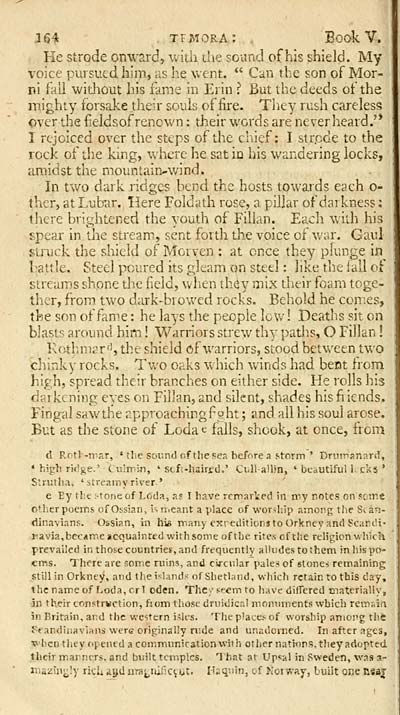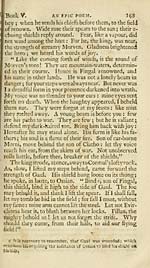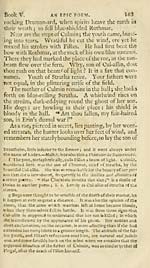Download files
Complete book:
Individual page:
Thumbnail gallery: Grid view | List view

164 TFMORA: . BookV.
He strode onward, with die sound of his shield. My
voice pursued him, as he went. " Can the son of Mor-
ni fdi without his fame in Erin ? But the deeds of the
mighty forsake their souls of fire. Tiiey rush careless
over the feldsof renown : their words are never heard.'*
I rejoiced over the steps of the chief: I str.cde to the
rock of the king, where he sat in his wandering locks,
amidst the mountain-wind.
In two dark ridges bend the hosts towards each o-
thcr, at LubTir. Here Foldath rose, a pillar of darkness :
tliere brightened the youth of Fillan. Each with his
spear in the stream, sent forth the voice of war. Gaul
struck the shield of Morven : at once they plunge in
battle. Steel iX)ured its gleam on steel : like the fail of
streams shone the field, when thfiy mix their foam toge-
ther, from two diu-k-browed rocks. Behold he com.es,
the son of fame : he lays the people low ! Deaths sit on
blasts around him ! Warriors strew thy paths, O Fillan !
Kothnu^r '', the shield of warriors, stood between two
clunky rocks. Tv/o oaks which winds had bent from
high, spread their branches on either side. He rolls his
darkening eyes on Fillan, and silent, shades his friends.
Fingal sawtfie approachingf pht ; and all his soul arose.
But as the stone of Lodae falls, shook, at once, from
d RptV-n-sr, ' tlie sound of the sea before a f.torm"' Drumannrd,
' high ridge.' Culmin, ' scfi-hairfd.' CuUallJn, ' beautiful 1. cks '
Strutha, ' streamy river* '
e Ey the .•-toneof Loda, as I have remarlced in my notes on some
other poeitis of Ossian, is meant a place of worship among the Scan-
dinavians. Ossian, in hie many exreditions to Orkney and Scandi-
i'avia,bec*meac<|uainted with some ofthe rites of the religionwhich
prevailed in those countries;, and frequently alludes to them in his po-
ems. There are some ruins, and circular pales of stone* remaining
still in Orkney, and tliei'-land.« of Shetland, which retain to this day,
the name of Loda, crl oden. ThC)-seem to have differed materially,
in their construction, fiom those druidical monuments which retT)f,ia
Jn Britain, and tlic western isles. The places of worship amoi'g the
ft ardiuavi^ins were originally rude and unadorned. In after ages,
•plicn they opened a communication with otliernatrors, they adopted
their marners, and built temples. That at Upsal in Sweden, was a-
iiiazin<i!y rich a]fd irai^nif.cvut. Hsquin, of Norway, built one near
He strode onward, with die sound of his shield. My
voice pursued him, as he went. " Can the son of Mor-
ni fdi without his fame in Erin ? But the deeds of the
mighty forsake their souls of fire. Tiiey rush careless
over the feldsof renown : their words are never heard.'*
I rejoiced over the steps of the chief: I str.cde to the
rock of the king, where he sat in his wandering locks,
amidst the mountain-wind.
In two dark ridges bend the hosts towards each o-
thcr, at LubTir. Here Foldath rose, a pillar of darkness :
tliere brightened the youth of Fillan. Each with his
spear in the stream, sent forth the voice of war. Gaul
struck the shield of Morven : at once they plunge in
battle. Steel iX)ured its gleam on steel : like the fail of
streams shone the field, when thfiy mix their foam toge-
ther, from two diu-k-browed rocks. Behold he com.es,
the son of fame : he lays the people low ! Deaths sit on
blasts around him ! Warriors strew thy paths, O Fillan !
Kothnu^r '', the shield of warriors, stood between two
clunky rocks. Tv/o oaks which winds had bent from
high, spread their branches on either side. He rolls his
darkening eyes on Fillan, and silent, shades his friends.
Fingal sawtfie approachingf pht ; and all his soul arose.
But as the stone of Lodae falls, shook, at once, from
d RptV-n-sr, ' tlie sound of the sea before a f.torm"' Drumannrd,
' high ridge.' Culmin, ' scfi-hairfd.' CuUallJn, ' beautiful 1. cks '
Strutha, ' streamy river* '
e Ey the .•-toneof Loda, as I have remarlced in my notes on some
other poeitis of Ossian, is meant a place of worship among the Scan-
dinavians. Ossian, in hie many exreditions to Orkney and Scandi-
i'avia,bec*meac<|uainted with some ofthe rites of the religionwhich
prevailed in those countries;, and frequently alludes to them in his po-
ems. There are some ruins, and circular pales of stone* remaining
still in Orkney, and tliei'-land.« of Shetland, which retain to this day,
the name of Loda, crl oden. ThC)-seem to have differed materially,
in their construction, fiom those druidical monuments which retT)f,ia
Jn Britain, and tlic western isles. The places of worship amoi'g the
ft ardiuavi^ins were originally rude and unadorned. In after ages,
•plicn they opened a communication with otliernatrors, they adopted
their marners, and built temples. That at Upsal in Sweden, was a-
iiiazin<i!y rich a]fd irai^nif.cvut. Hsquin, of Norway, built one near
Set display mode to: Large image | Transcription
Images and transcriptions on this page, including medium image downloads, may be used under the Creative Commons Attribution 4.0 International Licence unless otherwise stated. ![]()
| Early Gaelic Book Collections > Ossian Collection > Poems of Ossian, the son of Fingal > Volume 2 > (174) |
|---|
| Permanent URL | https://digital.nls.uk/77914819 |
|---|
| Shelfmark | Oss.54 |
|---|---|
| Attribution and copyright: |
|
| Description | Selected books from the Ossian Collection of 327 volumes, originally assembled by J. Norman Methven of Perth. Different editions and translations of James MacPherson's epic poem 'Ossian', some with a map of the 'Kingdom of Connor'. Also secondary material relating to Ossianic poetry and the Ossian controversy. |
|---|
| Description | Selected items from five 'Special and Named Printed Collections'. Includes books in Gaelic and other Celtic languages, works about the Gaels, their languages, literature, culture and history. |
|---|

